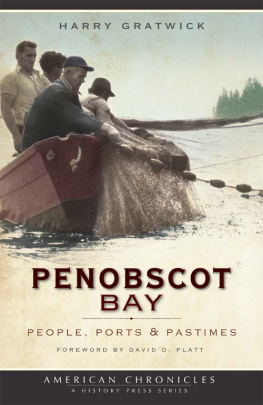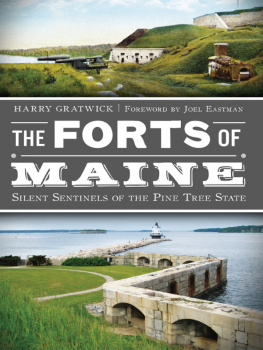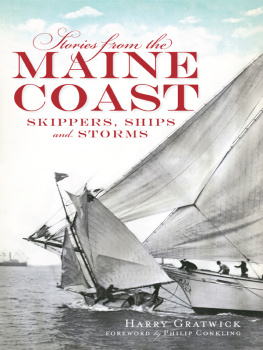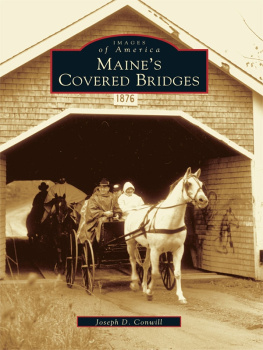Gratwick - Penobscot Bay
Here you can read online Gratwick - Penobscot Bay full text of the book (entire story) in english for free. Download pdf and epub, get meaning, cover and reviews about this ebook. City: United States, year: 2009, publisher: The History Press, genre: History. Description of the work, (preface) as well as reviews are available. Best literature library LitArk.com created for fans of good reading and offers a wide selection of genres:
Romance novel
Science fiction
Adventure
Detective
Science
History
Home and family
Prose
Art
Politics
Computer
Non-fiction
Religion
Business
Children
Humor
Choose a favorite category and find really read worthwhile books. Enjoy immersion in the world of imagination, feel the emotions of the characters or learn something new for yourself, make an fascinating discovery.
Penobscot Bay: summary, description and annotation
We offer to read an annotation, description, summary or preface (depends on what the author of the book "Penobscot Bay" wrote himself). If you haven't found the necessary information about the book — write in the comments, we will try to find it.
Penobscot Bay — read online for free the complete book (whole text) full work
Below is the text of the book, divided by pages. System saving the place of the last page read, allows you to conveniently read the book "Penobscot Bay" online for free, without having to search again every time where you left off. Put a bookmark, and you can go to the page where you finished reading at any time.
Font size:
Interval:
Bookmark:
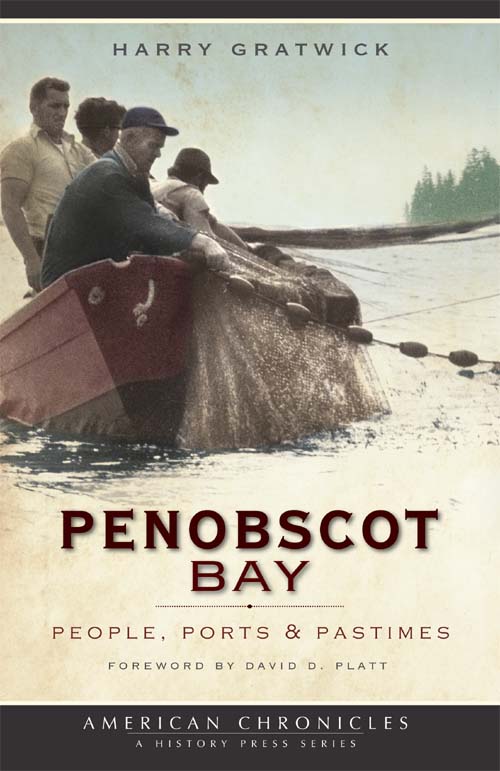
PENOBSCOT
BAY
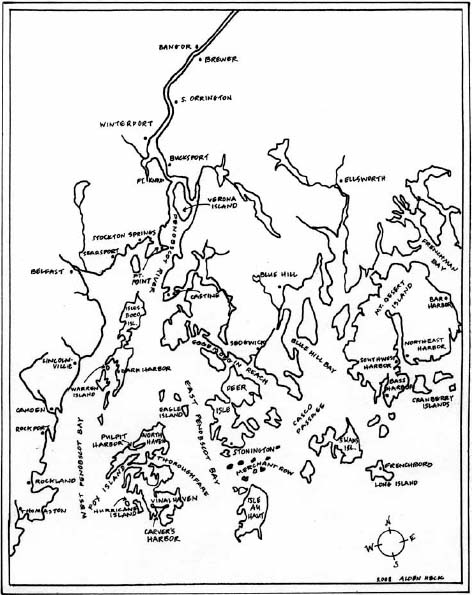
Penobscot Bay and vicinity.
BAY

PEOPLE, PORTS & PASTIMES
HARRY GRATWICK

Published by The History Press
Charleston, SC 29403
www.historypress.net
Copyright 2009 by Harry Gratwick
All rights reserved
Cover photograph by Geoffrey Gratwick.
First published 2009
Second printing 2011
e-book edition 2011
ISBN 978.1.61423.136.3
Library of Congress Cataloging-in-Publication Data
Gratwick, Harry.
Penobscot Bay : people, ports and pastimes / Harry Gratwick.
p. cm.
Includes bibliographical references.
print edition ISBN 978-1-59629-623-7
1. Penobscot Bay Region (Me.)--History. 2. Penobsoct Bay Region (Me.)--Social life and customs. 3. Penobscot Bay Region (Me.)--Biography. 4. Vinalhaven Island (Me.)--History. 5. Vinalhaven Island (Me.)--Social life and cutoms. 6. Vinalhaven Island (Me.)--Biography. I. Title.
F27.P37G736 2009
974.13--dc22
2009001704
Notice: The information in this book is true and complete to the best of our knowledge. It is offered without guarantee on the part of the author or The History Press. The author and The History Press disclaim all liability in connection with the use of this book.
All rights reserved. No part of this book may be reproduced or transmitted in any form whatsoever without prior written permission from the publisher except in the case of brief quotations embodied in critical articles and reviews.
The sea became my unspoken challenge: the wind, the tide, the fog, the ledge, the bell, the gull that cried help, the never-ending threat and bluff of weather.
E.B. White
Every place has a history, of course, but sometimes that story is particularly rich. Such is the case of Penobscot Bay in Maine. One of the East Coast's great bodies of water, Penobscot Bay has witnessed significant events from the times of the earliest European explorers and the American Revolution to the present. Deep and navigable, rich in resources and at times strategically important, Penobscot Bay and the long river that empties into it from interior Maine have been battlefields and highways, sources of great wealth and backdrops for events that changed lives far beyond the bay itself.
Harry Gratwick has spent many summers on an island in Penobscot Bay, absorbing this region's multilayered history in different ways: as a diligent researcher in local historical societies; as a good listener and collector of stories; and as a gifted writer with a feel for what's really interesting to readers.
I first became acquainted with Harry as his editor at Working Waterfront and Island Journal, two publications with a deep interest in the history of coastal Maine and its island communities. Many years ago, he began coming to me with story ideas that just got better and betterwhere the granite from Vinalhaven's quarries ended up; how Franklin D. Roosevelt fooled everyone into thinking he'd gone fishing when he was actually meeting with Winston Churchill; when islanders really took their baseball seriously; how an island goes to war. He has profiled historic vessels such as Monhegan's venerable mail boat and written about the little boats that summer folks race in the Fox Islands Thorofare and about rumored sightings of German submarines in the bay during World War II. Not all of his story ideas were entirely originalI'd read versions of some of them in other placesbut Harry's take on each one was original and made me want more. The variety is endless, and it keeps on coming.
Harry taught history and coached baseball at Germantown Friends School in Philadelphia for many years, and his writing reflects the interests that must have led him into the classroom in the first place: people, events and the way ordinary happenings like the availability of a particular resource or a change in the weather or how the arrival of the right person at the right time and place can change history and affect everyone else's life. He's a great interviewer and quote collector; if he hadn't been a teacher, I suspect he would have been a very good newspaper reporter. Of course, in Harry's case, he would have covered sports, particularly baseball, about which he is passionate. When he retired from teaching a few years ago, the school named its ball field for him.
Harry and Penobscot Bay are well matched, and it's not surprising that he has written so much about this beautiful and historic place. The bay has had many chroniclers over the years, and I'm confident that Harry will one day be known as one of the best.
David D. Platt
David Platt is former editor of Working Waterfront and Island Journal, both publications of the Island Institute, Rockland, Maine.
This book could not have been written without the ongoing assistance of Bill Chilles, Sue Radley, Roy Heisler and others at the Vinalhaven Historical Society. And Nan Lee at the North Haven Historical Society should know how much I appreciate all of her help, as well as that of Bud Thayer, Collette Haskell, Herb Haskell, Herb Parsons and George Lewis.
I would like to thank David Platt and David Tyler, editors past and present at the Working Waterfront, for their support, as well as Lance Warren at The History Press, who sold me on the idea of a book in the first place and provided skillful guidance throughout the process.
I am very grateful to Dennis Pratt, Steve Ames, Chuck Curtis and Roman Cooper for their basketball recollections, as well as John Shiffert, Brud Carver, Ducky Haskell, Buzz Young and Paul Chilles for their baseball memories. Other folks who supplied a great deal of help and information include Paul Pendleton from Islesboro; Gil Merriam and the Rockland Cooperative History Project; Jack Elliot's brother John and his shipmates Art Tilley and Gerry Dupuis; Bill Cook at the Bangor Public Library; Rachel Kotkoskie at the Photo Workshop in Philadelphia; and Paul Berry at the Calvert Marine Museum.
Special thanks to Earl on the River Morrill, and kudos to my longtime colleague, Denny Heck, at Germantown Friends School for her map. Finally, a salute to my brothers, Joel and Geoffrey Gratwick, for their advice on all matters nautical and to my wife, Tita, for her love, her unfailing patience and, most importantly, for her editorial expertise.
From a child's perspective, most of what I remember about World War II involved shortages and strict rationing. Rationing, including gas and rubber, meant that my family couldn't drive to Vinalhaven for our summer vacation. By the summer of 1945, however, Germany had surrendered and the war in Europe was over. With the easing of rationing restrictions, my parents were able to accumulate enough gas coupons to make the trip to Maine from our home in Tarrytown-on-Hudson, New York.
The drive north, with my four brothers and sisters and a dog crammed into our car, must have been a nightmare for my parents. Remember, this was before the days of I-95 and SUVs. Although the Maine Turnpike was begun in 1947, it was not completed until 1955. This meant that we had to take Route 1, which was mostly two lanes in the 1940s. After an endless trip, we finally arrived in Rockland in the middle of the night without a place to stay. I remember the night man at the Thorndike Hotel reluctantly letting us sleep on couches in the lobby for a few hours before waking us up in time to catch the 7:00 a.m. boat. We didn't take our car to Vinalhaven in 1945. The ferryboat was
Font size:
Interval:
Bookmark:
Similar books «Penobscot Bay»
Look at similar books to Penobscot Bay. We have selected literature similar in name and meaning in the hope of providing readers with more options to find new, interesting, not yet read works.
Discussion, reviews of the book Penobscot Bay and just readers' own opinions. Leave your comments, write what you think about the work, its meaning or the main characters. Specify what exactly you liked and what you didn't like, and why you think so.

